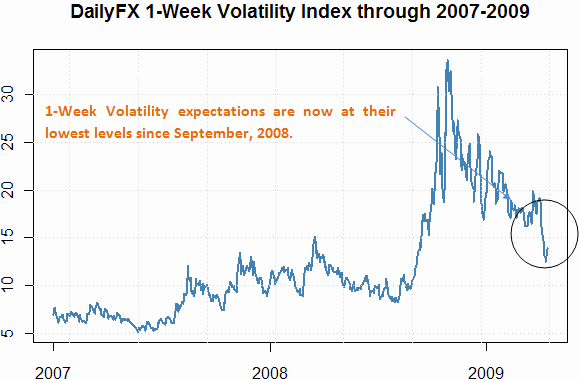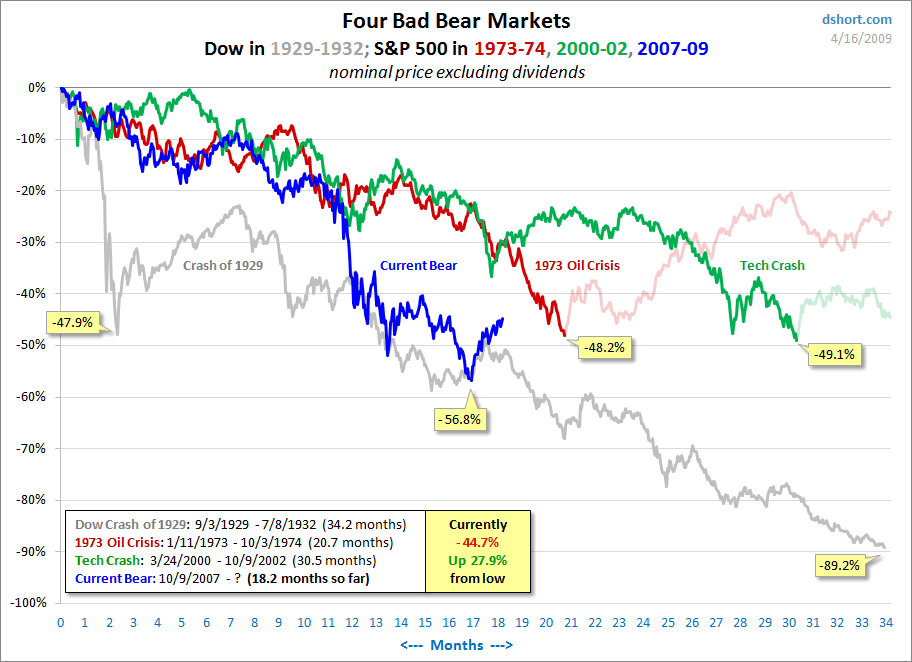The stock market rally that has unfolded over the last month is nothing short of incredible; stocks have now risen 25% since bottoming on March 9. Unsurprisingly, the rally has been deeply intertwined with an ebb in volatility. “The VIX, which measures options trading sentiment on the S&P 500 Index has crashed from a high of 80.86 to 38.85 ahead of Thursday’s trading, a 52% decline.” [Chart below courtesy of DailyFX]

This decline in volatility can be witnessed in all corners of the financial markets, including forex. “The lack of volatility in currency markets has been especially mysterious considering the relationship between the dollar and risk adversity since the onset of the credit crisis almost 20 months ago.” The Dollar has been locked in a comparatively tight range, with one analyst even using the word “listless” to describe its recent performance. With the exception of the Japanese Yen- which is declining for economic reasons- most currencies are gradually stabilizing.
Does this lull represent the end of the storm or the metaphorical eye of the hurricane? Naturally, the answer depends on who you ask. Personally, I am inclined to believe that it is only temporary. The last year has already witnessed two “false starts,” and it wouldn’t surprise me if this time around proved to be yet another one in hindsight.
Whether or not the economic picture is “less bad” than before, it remains grim. “The system is bursting with overcapacity. Demand is falling faster than any time since the 1930s. Inventories will have to be trimmed and budgets cut to muddle through the downtimes. Foreign trade has slowed to a crawl, auto sales are down by 40 percent or more, and unemployment is rising at 650,000 per month.” Two economists, meanwhile, have published a widely-circulated piece which uses juxtaposed graphs as a basis for comparing the current downturn to the Great Depression. Of course, this comparison has become hackneyed, but from a purely statistical standpoint, it’s hard to dispute.
 The difficulty with forecasting the current recession is that its causes are structural rather than cyclical. Argues one analyst: “It is unwise and foolish to treat this bear market like any other in the post-WW II period because it is totally unique; the scope and depth of the ongoing destruction of consumer and business credit, bank balance sheet compression and insolvency, consumer retrenchment and soaring unemployment should not be underestimated.” As a result, many economic models are out of date. “Economic forecasters have underestimated how bad it is because they have over-estimated the strength of the real economy and failed to take into account the extent of its dependence upon a buildup of debt that relied on asset price bubbles.”
The difficulty with forecasting the current recession is that its causes are structural rather than cyclical. Argues one analyst: “It is unwise and foolish to treat this bear market like any other in the post-WW II period because it is totally unique; the scope and depth of the ongoing destruction of consumer and business credit, bank balance sheet compression and insolvency, consumer retrenchment and soaring unemployment should not be underestimated.” As a result, many economic models are out of date. “Economic forecasters have underestimated how bad it is because they have over-estimated the strength of the real economy and failed to take into account the extent of its dependence upon a buildup of debt that relied on asset price bubbles.”
Not only will future growth have to be built on actual wealth (rather than debt), but the mountain of debt that fueled the most recent economic expansion will also have to be resolved. The most recent IMF estimates imply that “Toxic debts racked up by banks and insurers could spiral to $4 trillion.” Until all of this bad debt can be identified and sorted, economic recovery will remain illusory.

0 comments:
Post a Comment